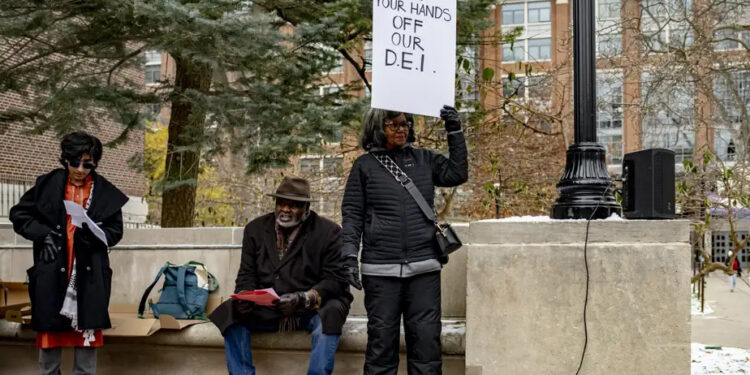(Washington) A federal judge invalidated two measures from the Trump administration on Thursday to abolish diversity, equity and inclusion programs (EDI) in the country’s schools and universities.
In his decision, the district judge Stephanie Gallagher, of Maryland, said that the Department of Education had violated the law by threatening to cut federal funding from educational establishments which were pursuing their initiatives in matters of diversity, equity and inclusion.
The guidelines have been suspended since April, when three federal judges blocked various parts of the anti-EDI measures of the Department of Education.
Thursday’s decision followed a request for summary judgment filed by the American Federation of Teachers and the American Association of Sociology, which had challenged government measures in a legal action brought in February.
The case relates to two notes of the Department of Education ordering schools and universities to end any “decision -making based on race”, under penalty of sanctions that can go as far as the total loss of federal funding. This decision is part of a campaign aimed at putting an end to practices that the Trump administration describes discrimination against American white and Asian students.
The new decision orders the department to abandon these directives, as they contravene procedural requirements. Mme Gallagher, however, wrote that she did not rule on the character “good or bad, prudent or insane, just or unfair” of these policies.
Mme Gallagher, appointed by President Donald Trump, rejected the government’s argument that service notes were simply used to remind schools that discrimination is illegal.
“This has led to a radical change in the way in which the education department regulates educational practices and class behavior, bringing together millions of teachers that their words, even legal and beneficial, can lead to sanctions for themselves or their schools,” wrote Mr.me Gallagher.
Democracy Forward, a law firm representing the complainants, described this major victory decision in the face of attacks by the EDI.
“Threatening teachers and sowing chaos in American schools is part of the war of the administration against education, and today, the people won,” said Skye Perryman, president and general manager of the group.
The Department of Education did not comment immediately on Thursday.
The conflict started with a note of February 14 declaring that any taking into account of the race in admissions, financial aid, hiring or other aspects of university and student life would be considered a violation of the federal law on civil rights.
This note has considerably widened the government’s interpretation of a 2023 Supreme Court decision prohibiting universities from taking into account the race in their admission decisions. The government argued that this decision applied not only to admissions, but to the entire education system, prohibiting any “preference based on race”.
“Educational establishments have toxic to the students with the false postulate in a toxic way that the United States is based on a systemic and structural racism has promoted discriminatory policies and practices,” wrote Craig Train, acting assistant secretary of the Department’s Civil Rights Office.
Another note, published in April, asked the educational agencies of states to certify that they did not use “illegal practices in terms of Dei”. The offenders were likely to lose federal funds and to be prosecuted under the law on false declarations, according to the note.
In total, these directives have constituted a complete overhaul of the government’s approach to civil rights in education. They aimed at the policies created to remedy persistent racial disparities, affirming that these practices constituted a form of discrimination in itself.
These notes have aroused a wave of negative reactions from states and educational groups, which qualified these practices of illegal government censorship.
In its complaint, the American Federation of Teachers accused the government of imposing “vague and highly subjective” limits on the country’s schools. She said that teachers should “choose between restricting their freedom of expression and association, protected by the Constitution, or risking losing federal funds and being prosecuted”.



